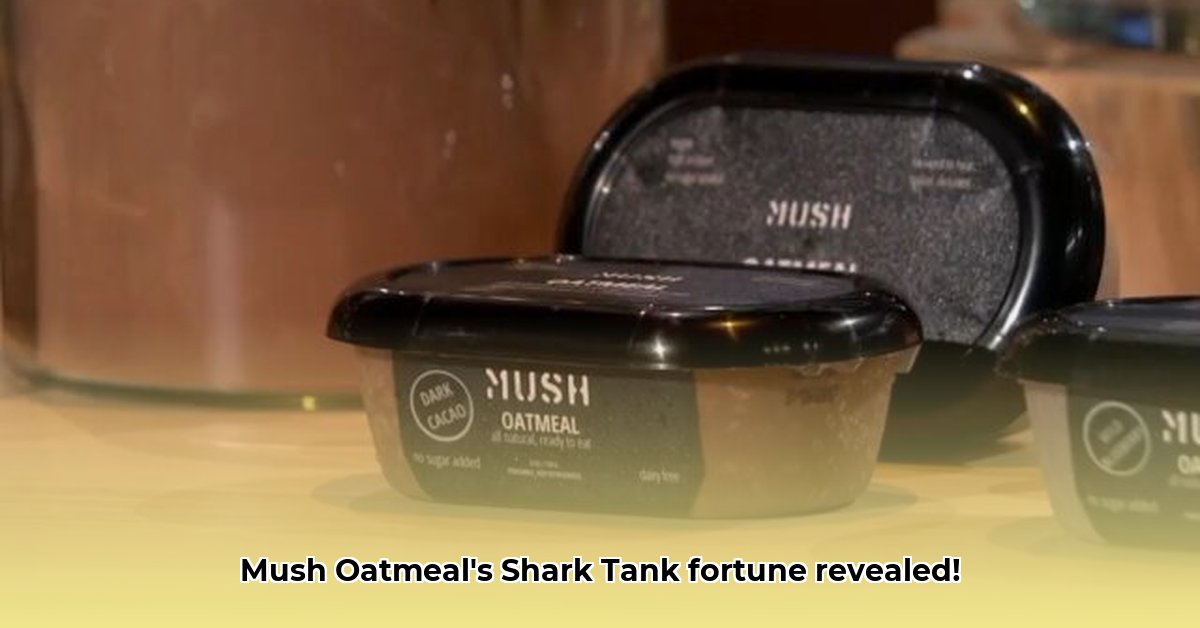
From a humble farmers' market stall to a multi-million-dollar enterprise, Mush Oatmeal's journey exemplifies the power of a compelling product and shrewd business strategy. This narrative explores their remarkable rise, highlighting both their triumphs and the challenges they overcame. Learn more about other successful Shark Tank ventures like this one.
From Farmers Market Finds to National Favorite
Mush Oatmeal's origin story begins at a local farmers' market. The founders' unique cold-soaked oatmeal quickly gained popularity, proving the product's appeal and establishing a strong foundation. Word-of-mouth marketing created significant early buzz, but scaling up to a national market required a bold move.
The Shark Tank Game Changer
Mush Oatmeal's appearance on Shark Tank was a pivotal moment. Their compelling pitch secured a $300,000 investment from Mark Cuban, providing not only capital but invaluable mentorship and brand exposure. This national spotlight significantly amplified brand recognition, setting the stage for exponential growth.
A Rocket-Fueled Rise: From $70,000 to Millions
Post-Shark Tank, Mush Oatmeal experienced explosive growth. Annual sales surged from $70,000 to over $5 million, a testament to their effective go-to-market strategy. Strategic partnerships with major retailers like Whole Foods, Walmart, Target, and Costco dramatically expanded their reach and propelled their sales. However, this rapid growth also presented new challenges.
Navigating the Challenges: The Ups and Downs of Success
Maintaining profitability amidst rapid expansion proved difficult. Mush Oatmeal's premium pricing strategy, while reflecting the high-quality ingredients, posed affordability concerns. Balancing premium quality with broader market accessibility required constant adaptability. The competitive ready-to-eat breakfast market demanded innovation and strategic adjustments to maintain a competitive edge. Did their premium pricing strategy ultimately hinder their growth, or did it contribute to their brand equity? Only time will tell.
The Future of Mush: Maintaining Momentum and Charting New Course
Mush Oatmeal’s future looks promising. Their continued success hinges on several key strategies: diversifying product lines, exploring international markets, and refining their brand messaging. Investment in product innovation and strategic marketing will be crucial for sustained growth and maintaining a competitive edge. The company’s long-term viability depends on a thoughtful balance between maintaining profitability and expanding market reach. What innovative strategies will they employ to sustain this momentum?
Key Takeaways: Three Pivotal Points
- Strategic Partnerships: Securing deals with major retailers significantly expanded market reach, driving substantial revenue growth.
- Adaptable Pricing: Balancing premium pricing with market accessibility required continuous monitoring and adjustments based on consumer feedback and sales data.
- Brand Building: Cultivating a strong brand identity and emphasizing the product's unique qualities helped justify the premium pricing strategy.
How to Price a Premium Ready-to-Eat Breakfast Product for Maximum Profitability: A Step-by-Step Approach
- Comprehensive COGS Analysis: Precisely calculate all costs—ingredients, labor, packaging, marketing, and distribution.
- Rigorous Competitor Analysis: Thoroughly research competitors' pricing strategies and value propositions.
- Strategic Channel Pricing: Develop optimal pricing strategies for various sales channels (DTC, retail partnerships).
- Data-Driven Market Research: Gather consumer feedback on price sensitivity to inform pricing decisions.
- Iterative Price Adjustments: Continuously monitor sales and make data-driven adjustments to maximize profitability.
- Effective Branding: Build a strong brand identity to justify a premium price point and attract the target customer.
The Mush Oatmeal story serves as a compelling case study in entrepreneurial success. Their journey, marked by both remarkable growth and strategic challenges, offers valuable insights for aspiring entrepreneurs in the food and beverage industry. Their ability to adapt and innovate in a competitive market underscores the importance of adaptability, strong branding, and data-driven decision-making.